|
|
|
Sort Order |
|
|
|
Items / Page
|
|
|
|
|
|
|
| Srl | Item |
| 1 |
ID:
125036
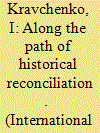

|
|
|
|
|
| Publication |
2013.
|
| Summary/Abstract |
THE THOUSAND-YEAR HISTORY of cooperation and opposition, alliance and hostility, the tragedy of the two world wars, and the decades of bloc confrontation have united the fates of Russians and Germans. Their common past has become a solid foundation for developing bilateral relations that have long gone beyond the framework established by political expediency and economic efficiency. Our interaction has acquired a unique humanitarian dimension that penetrates and cements it at all levels and in all spheres, reflecting its mature and strategic nature.
|
|
|
|
|
|
|
|
|
|
|
|
|
|
|
|
| 2 |
ID:
125024
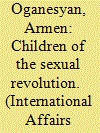

|
|
|
|
|
| Publication |
2013.
|
| Summary/Abstract |
EUROPE'S SEXUAL REVOLUTION has naturally evolved into a homosexual revolution.
The lower house of the French Parliament approved a bill that would grant same-sex couples the right to marry and adopt children, and at once official Paris began to exert increasing pressure on Russia to reconsider a law that recognizes marriage only if it's between a man and a woman.
|
|
|
|
|
|
|
|
|
|
|
|
|
|
|
|
| 3 |
ID:
125015


|
|
|
|
|
| Publication |
2013.
|
| Summary/Abstract |
BY THE TURN OF THE CENTURY, the developing countries, or at least many of them, were demonstrating impressive economic dynamics which finally made them global political players. This shift of historic dimensions can be described as a great geopolitical and geoeconomic revolution and the most impressive features of international relations; it will extend into the next few decades, in the very least.
Asia, in the very heart of the process, demonstrates all these trends; the Asian countries are better described as pioneers ("forwards") and the main moving force. The scope and scale of its economic and political transformations and its strong and strengthening foreign policy positions cannot but amaze.
|
|
|
|
|
|
|
|
|
|
|
|
|
|
|
|
| 4 |
ID:
125034


|
|
|
|
|
| Publication |
2013.
|
| Summary/Abstract |
THE MINISTRY OF FOREIGN AFFAIRS was the first among the government agencies in Russia to start actively introducing automation into its work. This began in 1983, when the country's leadership launched a legal and regulatory framework for joint work and coordination of action by various departments to ensure entry to the USSR for an increased flow of foreign nationals. The urgency of the task became clear after the 1980 Moscow, Tallinn, Leningrad, Kiev and Minsk XXII Summer Olympic Games, when the number of participants, guests and spectators in Moscow alone exceeded 200,000.
|
|
|
|
|
|
|
|
|
|
|
|
|
|
|
|
| 5 |
ID:
125039


|
|
|
|
|
| Publication |
2013.
|
| Summary/Abstract |
THE GLOBAL CLIMATE CHANGE problem has long been firmly among the most important new challenges and threats of the 21st century. The international community became especially aware of the problem over recent few years, as the so-called first commitment period under the Kyoto Protocol (KP)* was drawing to a close. It ended on December 31. 2012.
|
|
|
|
|
|
|
|
|
|
|
|
|
|
|
|
| 6 |
ID:
125028
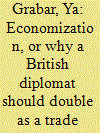

|
|
|
|
|
| Publication |
2013.
|
| Summary/Abstract |
FOREIGN POLICY cannot remain frozen; it is as fluid as any other sphere of social relations. Indeed, at different stages of human history, wars, national and religious movements, technical innovations, and scientific discoveries triggered changes in world politics. In the last five years, global economy gradually recovering from the world crisis which began in 2008 has been a catalyst of such changes. Economic problems which have not yet left the stage affected and continue to affect the UK foreign policy.
|
|
|
|
|
|
|
|
|
|
|
|
|
|
|
|
| 7 |
ID:
125013
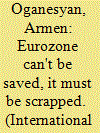

|
|
|
|
|
| Publication |
2013.
|
| Summary/Abstract |
THE HEAD OF SAXO BANK, Lars Christensen said in September last year, "the Eurozone does not need to be saved, it must be scrapped." It seems that the events on the small romantic island of Cyprus are finally consolidating this trend, which for lack of political will would be not so much administrative as cumulative and suicidal in character.
"All these officials are afraid to look the problem in the eye. The main problem is that there is one currency, but many completely different economies. Greece, with its uncompetitive economy, needs a weak currency. The German currency, obviously, should be stronger than the current euro. There is only one solution - to make more currencies. "
|
|
|
|
|
|
|
|
|
|
|
|
|
|
|
|
| 8 |
ID:
125035


|
|
|
|
|
| Publication |
2013.
|
| Summary/Abstract |
IN JULY 2011, a statement of intentions was signed at the German-Russian intergovernmental consultations in Hannover to hold a Cross-Cultural Year of Germany in Russia and Russia in Germany from June 2012 to June 2013.
Most of the events within the framework of the Cross-Cultural Year have already taken place. Moscow and St. Petersburg were the regional centers of the Year of Germany in Russia in 2012, while the Russian regions assumed this role in 2013.
German-Russian cultural ties have a long and rich history. At the end of the 1980s, cultural exchanges were carried out at all levels: between the federal states of Germany and the regions of Russia and between cities, universities, libraries, archives, and museums of both countries. At the political level, an agreement on cultural cooperation signed on December 16, 1992 between the governments of both countries formed the contractual foundation for cultural interaction between Russia and Germany.
|
|
|
|
|
|
|
|
|
|
|
|
|
|
|
|
| 9 |
ID:
125012
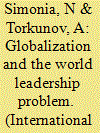

|
|
|
|
|
| Publication |
2013.
|
| Summary/Abstract |
THE BIPOLAR SYSTEM of international relations tumbled down unexpectedly leaving behind at least two consequential factors which for a long time remained ignored and/or deliberately pushed aside by many international players. First, the world no longer needed any state with a status of superpower, a product of ideological confrontation of two systems (two camps, in the Cold War parlance). Second, the trend toward a multipolar world (which had appeared and had been developing for some time behind the screen of bipolarity) became obvious. Still gaining strength (the process will take more than one decade to be completed) it ran into a wall of skepticism. For a long time, skeptics of all hues refused to recognize the obvious and piled one argument on another in an effort to disprove what they called the concept of multipolarity. Truth be said, this is not a concept - this is reality which explains why the American idea of unipolarity picked up by its supporters in other countries (Russia among them) promptly went out of fashion. Revived bipolarity came into vogue together with the global crisis and expectations that China's rapidly growing economy which responded to the world crisis by a slight drop of GDP (from 10% to 7.58%) and its rapidly mounting military might will make it one of the poles instead of the Soviet Union. There is a lot of talk about a "new type of capitalism" that challenges the Western capitalist countries and that outstrips them one after another. Having pushed Japan from its second place in world economy China is pushing forward toward America's first place. The larger part of expert community, including experts of the UN and other international organizations, is convinced that this is merely a matter of time. This is another myth with no serious or solid scientific foundation: superficial and formal comparison of statistics (GDP or even per capita GDP) which implies that the world is uniform cannot be taken for the starting point.
|
|
|
|
|
|
|
|
|
|
|
|
|
|
|
|
| 10 |
ID:
125030
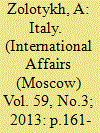

|
|
|
|
|
| Publication |
2013.
|
| Summary/Abstract |
ON FEBRUARY 24-25, Italy held an early parliamentary election, which saw the center-left coalition headed by Democratic Party leader Pier Luigi Bersani win the race and gain 55% of the seats in the Chamber of Deputies. But their slight lead in the Senate, with just five seats more than the center-right bloc's, has called into question the political survivability of the legislature, as well as the government to be formed by Bersani. For Italy, political instability is a familiar and ordinary phenomenon. During the past sixty-five years, 50 governments have succeeded one another there due to political crises. But for all that, the current early election may well prove to be a turning point in the country's political process, which in the last 18 years proceeded, according to Italian experts, under the banner of "Berlusconi-ism."
|
|
|
|
|
|
|
|
|
|
|
|
|
|
|
|
| 11 |
ID:
125018
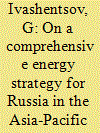

|
|
|
|
|
| Publication |
2013.
|
| Summary/Abstract |
CHAIRMANSHIP of the Asia-Pacific Economic Cooperation (APEC) in 2012 and the APEC summit in Vladivostok have opened a new phase in the Asian policy of Russia. The point at issue is to cement the recognition by the international community of the weighty role of our country as a Eurasian power, not only in Euro-Atlantic but also in Asia-Pacific affairs.
Today, the significance of the AP region has increased dramatically - both for the world in general, and Russia in particular, which is logical. For it is there that the center of world economic and political life is shifting from the Euro-Atlantic area. There are located the most powerful economies of the world - American, Chinese, and Japanese. The geographical proximity of the burgeoning South Asian giant India is being increasingly felt in the affairs of the region.
|
|
|
|
|
|
|
|
|
|
|
|
|
|
|
|
| 12 |
ID:
125041
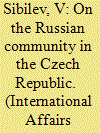

|
|
|
|
|
| Publication |
2013.
|
| Summary/Abstract |
I HAVE long wanted to write a short essay on the activity of our compatriot associations in the Czech Republic to show the special features and traits of the local Russian community and the history of its development. This desire is mainly prompted by the fact that I have had occasion to work for a total of 15 years, first in Czechoslovakia and then in the Czech Republic, witness the changing times, and am personally acquainted with many of the "characters and actors," including among the "Russian Czechs."
|
|
|
|
|
|
|
|
|
|
|
|
|
|
|
|
| 13 |
ID:
125026


|
|
|
|
|
| Publication |
2013.
|
| Summary/Abstract |
MUCH HAS BEEN SAID and written in Russia recently about the need to intensify obshchestvennaya (social), or publichnaya (public), diplomacy. The country's leadership has also set this objective. Importantly, in the decree signed on the very day of the assumption of office by the President-elect, "On Measures for Implementation of the Foreign Policy Course of the Russian Federation," Vladimir Putin gave the call "to make more efficient use of the resources of public diplomacy and draw civil society into the foreign policy process on behalf of more effective Russian foreign policy.."
|
|
|
|
|
|
|
|
|
|
|
|
|
|
|
|
| 14 |
ID:
125023
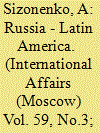

|
|
|
|
|
| Publication |
2013.
|
| Summary/Abstract |
THERE ARE CLEAR SIGNS of revival in relations between Russia and Latin American countries seen in rapidly increasing political contacts through meetings and summits,* the growing trade and the range of products in the region's economy, new Russian investments, and expanding cultural and academic ties. And this is in sharp contrast to the 1990s when Latin America ended up in the fringes of Russia's foreign policy. The situation is different now when this region has firmly become a part of Russian Federation's international relations. They are based above all on the variety of contacts in different formats between the two states and their mutual desire to achieve domestic prosperity.
|
|
|
|
|
|
|
|
|
|
|
|
|
|
|
|
| 15 |
ID:
125021
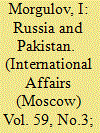

|
|
|
|
|
| Publication |
2013.
|
| Summary/Abstract |
DIPLOMATIC RELATIONS between our countries were established on May 1, 1948 following the understanding reached in New York between then Soviet deputy foreign minister Andrei Gromyko and Pakistani foreign minister Zafarullah Khan. Soon after, the embassies of Pakistan and the Soviet Union began work in Moscow and Karachi.
|
|
|
|
|
|
|
|
|
|
|
|
|
|
|
|
| 16 |
ID:
125033
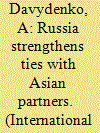

|
|
|
|
|
| Publication |
2013.
|
| Summary/Abstract |
THE OFFICIAL VISITS to India and Pakistan by a delegation of Russian parliamentarians led by RF Federation Council Speaker V.I. Matvienko have become a significant foreign policy event of 2013. These visits were not connected with each other. Each is important in its own right, as are the neighboring countries with which Russia maintains a respectful, business-like, partner-like dialog.
|
|
|
|
|
|
|
|
|
|
|
|
|
|
|
|
| 17 |
ID:
125022
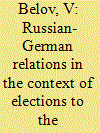

|
|
|
|
|
| Publication |
2013.
|
| Summary/Abstract |
IN 2013, special attention is focused on the state and prospects of the whole complex of relations between Russia and Germany: parliamentary elections in Germany, scheduled for September 22, 2013, will usher in a new four-year period of our cooperation. Naturally, such a division into periods is formal and is associated with a possible change of government in Germany. It is very likely that the upcoming elections will result in a new government, which will determine the main parameters of Germany's foreign policy, including its policy towards Russia.
|
|
|
|
|
|
|
|
|
|
|
|
|
|
|
|
| 18 |
ID:
125011


|
|
|
|
|
| Publication |
2013.
|
| Summary/Abstract |
ON FEBRUARY 12 OF THIS YEAR, Russian President V.V. Putin approved a new Foreign Policy Concept of the Russian Federation. The guidelines for the document, work on which lasted several months, were set by a presidential decree that was signed the day the head of state was inaugurated. The draft concept was discussed with the government agencies that are most actively involved in international activity, and considered in various departments of the Russian presidential administration. The Russian expert community was involved in its preparation, including members of the Foreign Ministry's Scientific Council. We are grateful to all those who have put forward their proposals and considerations, including in the pages of International Affairs.
|
|
|
|
|
|
|
|
|
|
|
|
|
|
|
|
| 19 |
ID:
125038


|
|
|
|
|
| Publication |
2013.
|
| Summary/Abstract |
WHEN IN ANCIENT TIMES people faced the question of how to ease pain in the human body, two approaches emerged. One of them was to study the system of the human body with examples of both dead and living people. In the 11th century BC, the first anatomical atlas of a healthy man appeared, and in the 19th century AD, it was complemented by indicators of normal physiology to take account of the process of disease. Ancient doctors realized that only with reliable information about human body maladies can their diagnosis be made with certainty and cures found.
|
|
|
|
|
|
|
|
|
|
|
|
|
|
|
|
| 20 |
ID:
125019


|
|
|
|
|
| Publication |
2013.
|
| Summary/Abstract |
THE BIG METEOR which exploded in an air blast over the Chelyabinsk region on February 15, 2013 was yet another graphic reminder of the real threat to our planet from asteroids and comets. According to the findings of Russian researchers (Institute of Solid-State Physics, Russian Academy of Sciences) announced by Academician Vladimir Fortov, the energy generated by this explosion was equivalent approximately to 400 kilotons of TNT.
|
|
|
|
|
|
|
|
|
|
|
|
|
|
|
|
|
|
|
|
|